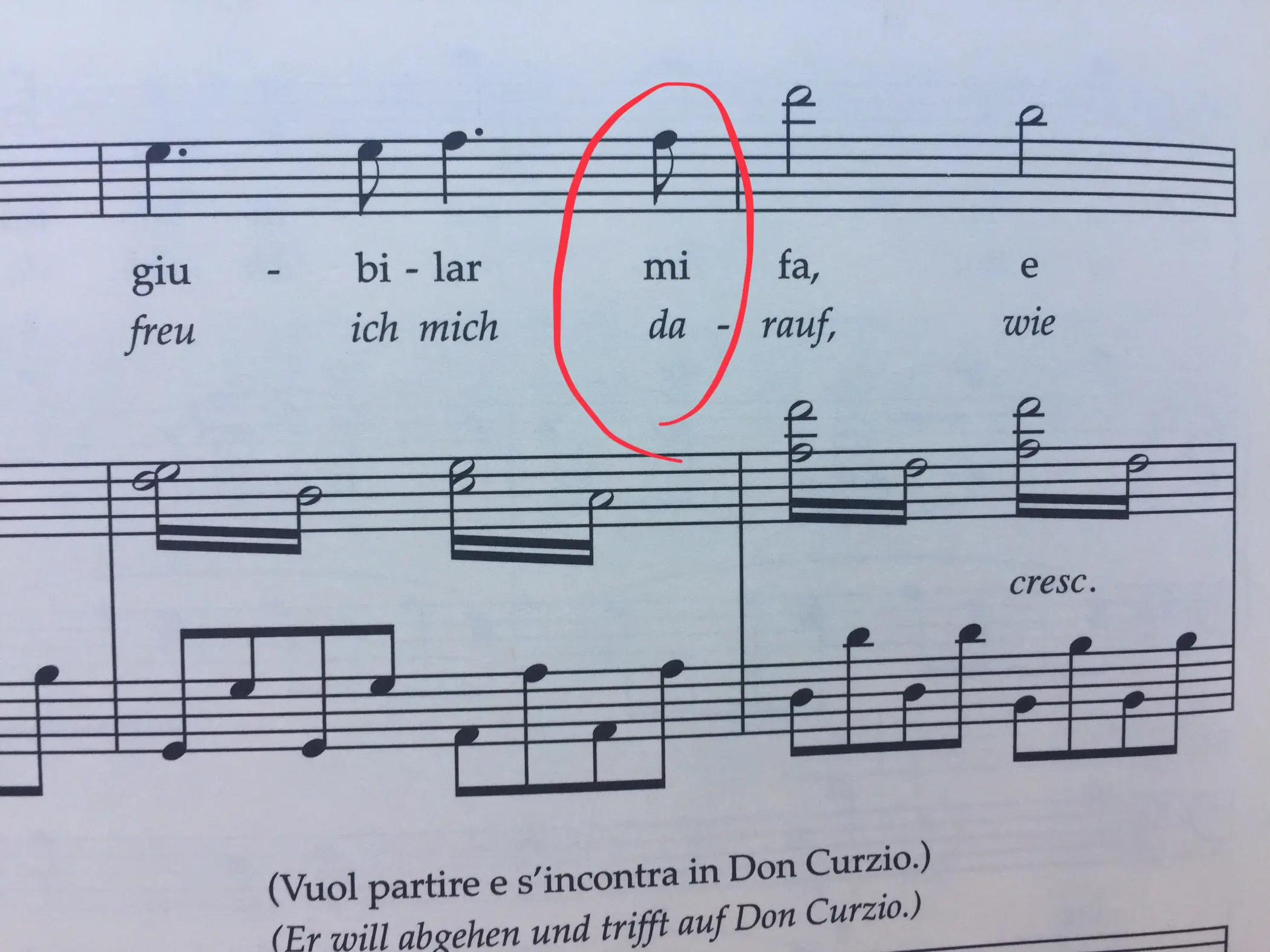
You’re about to sing an aria.
Your palms are sweaty, knees weak, arms are heavy (cue “Lose Yourself” by Eminem), and even though the high note is minutes away, you’re already thinking about it.
You loosen up your body and set up good posture. You begin to focus deeply and slip into character. Your pianist plays the intro but the thought creeps into your head again: “the high note.”
You start singing and the first few phrases go well. You’re spinning your sound and getting your breath underneath you: everything so far is awesome. And then once more, you find yourself thinking about that dang high note up ahead.
You keep singing and you’re really into the piece but the anticipation of the high note keeps hovering in your mind. The music gets louder, the harmonic rhythm quickens, the excitement builds…
and here it comes! The high note!!
Vinceeeeeeeeeeeeeeeróóó!
Talk about high pressure!
That’s what high notes are in the world of singing opera. It’s also the moment that everyone in the audience is waiting for because it’s so doggone exciting! It gives us chills to hear a singer at the extremity of their voice and stirs up a strong, even physical reaction when hearing it.
High notes have an element of risk—the risk that things may go well and excite something within us, but also the risk that there will be a possible flub or crack (I’ve been there and it’s NOT fun).
So how does an opera singer not “crack” under pressure? (ba–dum ching!)
Flying High
I have a handy little trick that I use before every high G, Ab, or A. It’s not technical by any means; it’s a mindset that I use to achieve a solid execution of a high note. So here goes!
The second before I sing a high note, I literally think:
“I’m going to sing the sh*t out of this note.”
Yes. I literally think that.
With an emphasis on “sh*t“.
Why does this work? It works because it tricks your brain. It trains you so that your psyche thinks your confidence is there, when you may not believe it yourself. Same thing goes for the opposite: if you constantly tell yourself negative things such as “This is gonna suck”, “I don’t have this”, or “what the hell is going to happen”, then you’re inherently reinforcing those thoughts over and over again until the point that you actually believe them.
Think about a singer whose high notes you admire. What is it about them that is so thrilling? What’s the one thing they all have in common?
They are fearless.
Even if a high note isn’t exceptional, the audience still senses that fearlessness, which is the epitome of virtuosity, and unless you crack, they’ll still think you’re a success when you show them that you’re successful. So just tell yourself that you’ll be successful before it happens!
I know this is no replacement for true vocal technique, and I’m not trying to be transcendental or hippie-dippie by saying, “think it, be it.” I’m saying that even if you already sing some kickass high notes, your lack of confidence can (and does!) get in the way of your best singing.
For example, if you tell yourself, “I’m a bad singer” when you are just making fixable mistakes, you are literally teaching yourself that you suck. How are you supposed to stand in front of thousands of people and perform with that sort of thinking? You can literally reprogram your brain and tell yourself, “I’m awesome” as you hit those tricky passages, or even the most simple ones! Do it in the practice room and it will stick with you when you hit the stage.
So yea, just think, “I’m going to to sing the sh*t out of this high note.” You’ll be surprised at how your talents will begin to show through your self-assuredness.
Self-Assessment
Sometimes things go wrong.
What then? You have to remind yourself that, “I am a great musician and this time it just didn’t work out how I wanted it to.” Separate yourself from your music-making and don’t associate your entire performance with how you sang one phrase.
And when things do go well, know that you are the one that achieved that great sound, rather than attribute it to luck.
You can read more about this idea in my blog post: My No-Nonsense Tricks To Combatting Nerves
But I Already Feel Confident
For those who already have the confidence to face the pressure of performing, here are two technical tips for singing high notes:
1. Energize and support the note that precedes the high note
We sometimes forget that the note before the high note is a good indicator of how the high note will go. Springboard from the lower note before the high note, if it’s a major third or more, like so:

2. Vowel Modification
This is a very complicated subject to write about in a short amount of time, but I’ll try my best. Basically, when a singer sings a high note, they sometimes sing a different vowel than what’s written in the score. They do this because certain vowels on their high notes allow for a more open sound to give it the necessary bloom.
It gets complicated when you have to choose which vowel you modify to. Every voice type has a different set of pitches and vowels that they modify, so it’s different for every singer. This is NOT something I could advise through a blog post, so you should consult your individual voice teacher.
My Journey To High Notes
It took me a while to sing high notes. For a baritone, it’s about finding that perfect combination of forward and back space. It’s a chicken and the egg sort of thing: not until you experience it can you do it, and not until you do it can you experience it.
21 year-old Lucas’ highest note was a high D (an entire fourth interval lower than where I sing now) because of my high larynx. Then I heard a baritone colleague of mine sing easy high notes and I simply imitated him in a practice room. NOTE: I know I spoke against imitation in my last post, but in this case I simply imitated his use of his support and extreme covering, not his actual sound, to achieve singing above a D.
All of a sudden, my first high G popped out. Granted, it was not good. It was over-covered and darkened but it excited me greatly. Over time, with help from my teachers (Joseph Amaya and John Maloy), I modified that sound into something more comfortable and that felt good in my voice. For me that meant a more forward placement.
Even though I had a G that carried with point, there was a final piece of the puzzle to it. It was the bow and arrow effect, the perfect combination of backwards and forward space where you flip into that high place while riding your support. It just sort of sits there in the space. Slightly covered with perfect vowel modification and just the right amount of support and air pressure. Boom! (special thanks to Sheri Greenawald and Marlena Malas for this)
Here’s a video of a bunch of my high notes:
And here are some singers whose high notes I admire:
- Erin Morley
- Gerald Finley
- Matthew Polenzani
- Bryan Hymel
- Ailyn Pérez
- Daniela Mack
- Greer Grimsley
- There are so many more, I only have so much blog left.
So, when push comes to shove in an audition or on the stage, just think of my special mantra to keep you in check.
It’s all a matter of practicing a fearless, positive mindset every time you face tough sh*t. And when you feel that high note rapidly approaching, just sing the sh*t out of it!
What do you think? Did you find this article interesting, entertaining, or helpful? Feel free to chime in with a comment below.
hi, it sounds too easy .. sure if you do have voice and range then the only thing is left is confidence ..
When i practice I first go slowly phrase by phrase, word by word … then I switch to a high pitch where I do feel tension but then I go back to original and its there .. so the first requirement is proper singing before attempting high notes .. i rarely happy with my first, second and 49th attempts but then gradually I start feeling how to manage air, strength and resonance .. all this comes with a lot of practice.. all big stars practiced at least 5-6 hours per day 5-6 times a week … for years (Pavarotti 8 years, Gigli 5, Domingo 6, and so on) so .. dont stress yourself if after 20 hours you still did not get it right … 🙂
Reblogged this on Kevin Starnes Bass – Baritone and commented:
I can’t stress enough how accurate this is.
Thanks so much! It’s practical stuff but it does work!
A great article. I teach a young baritone but cannot get him above a top D. I’m loathed to lower songs as they sound dull in the key. My student is so committed but seems physically unable to do the elusive Eflat. Posture is great, his voice is well produced. I’m at a loss.
Hi Nick, not knowing more about this case, I’d suggest for him to do lower baritone arias like Papageno, Don Giovanni, etc. Depending on his age, he may need to wait it out until his voice develops more fully. An E-flat isn’t a high note for a baritone, though. He may be a bass in the making. Again, I don’t know the full situation so it’s hard for me to offer any advice. I’d say try lip trills, humming, “ng”s on those notes to enter that extension of his voice. Best of luck Nick! You sound like a great teacher who really cares about his students.
Thank you. It’s great that you have taken time to consider the difficulties my student is having.
I can’t agree with this enough! Singers psyche themselves out and end up creating so much tension that the technique suffers. We all just need to relax and “sing the shit out of it.”
Thank you, dear Lucas, for those very good conseils.
God, I love that you’re a baritone, dude. Once again, thank you for the insight. It’s very useful!
I have recordings of my husband practicing Valentin’s Prayer from Margarete. I tell him I keep them for blackmail purposes. (Actually he is very good, but the practices…) Over here in Gutenberg land they teach us to “think roses, inhale the tone, and send it out through the skull cap” to hit the high notes. To be honest, your system fits the emotional situation better. Love your blog.